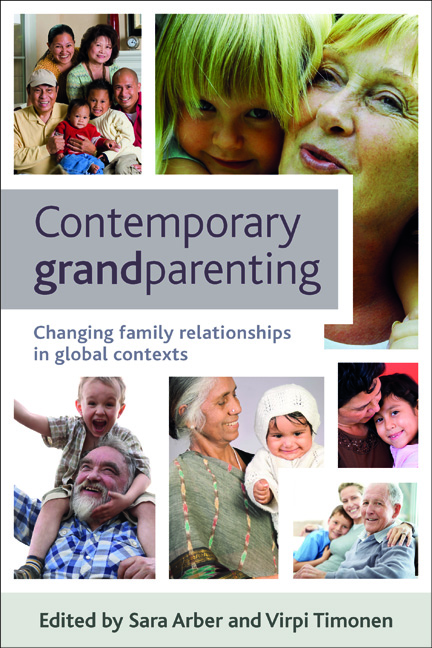nine - Grandfathering: the construction of new identities and masculinities
Published online by Cambridge University Press: 01 September 2022
Summary
Introduction
Men's roles and identities as grandfathers are insufficiently explored in social science literatures (Bates, 2009; Tarrant, 2010). There has been a proliferation of research on fathering and grandparenting in Britain (Clarke and Roberts, 2002; Dench and Ogg, 2002), but this has not resulted in further interest in grandfathers, whose roles, relationships, identities and practices remain inadequately theorised (Mann, 2007). However, some researchers have argued that grandfathers’ involvement in the lives of their grandchildren is equal to that of grandmothers (Leeson and Harper, 2009). The gendered nature of earlier research on grandparenting has resulted in men being excluded from most analyses, based on assumptions that they are less interested in family life than women, who are deemed the key kin keepers (Harper, 2005). Despite insufficient attention to grandparent identities more generally (Reitzes and Mutran, 2004), it is evident that being a grandfather influences how men perform and construct their identities in later life (Ando, 2005; Mann, 2007) and that grandfatherhood is an important part of the everyday identities of middle-aged and older men.
Traditional constructions of grandfathering assign essentialist conceptualisations to men that reflect rigid gendered boundaries. Men, for example, have been found to prefer to adopt roles in the family that are task orientated (Hagestad, 1985) as opposed to caring, resulting in expectations that they perform a ‘minister of the state’, or ‘head of the family’ role (Roberto et al, 2001). However, recent research suggests that being a grandfather is an identity through which men negotiate multiple and intersecting positions of social difference in their family relationships. Davidson and colleagues (2003, pp 178-9) suggest that:
An important and potentially paradoxical new role for older men is that of grandfather. It is paradoxical because, on the one hand, men may be exhibiting a ‘gentler’, more nurturing relationship with a grandchild than they had with their own children but, on the other hand, may still be viewed, and view themselves, as having the traditional patriarchal role as ‘sage’ or ‘wise man’.
- Type
- Chapter
- Information
- Contemporary GrandparentingChanging Family Relationships in Global Contexts, pp. 181 - 202Publisher: Bristol University PressPrint publication year: 2012



